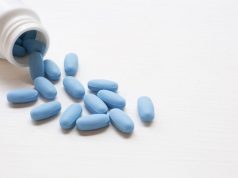Here are what the editors at HealthDay consider to be the most important developments in HIV & AIDS for January 2017. This roundup includes the latest research news from journal articles, as well as the FDA approvals and regulatory changes that are the most likely to affect clinical practice.
Diabetes Mellitus Prevalence Higher in HIV-Infected Adults
TUESDAY, Jan. 31, 2017 (HealthDay News) — HIV-infected adults have diabetes mellitus (DM) prevalence of 10.3 percent, which is higher than general population adults, according to a study published in the January issue of BMJ Open Diabetes Research & Care.
Full Text
Risk of Diabetes Down With HCV SVR in HIV/HCV Coinfection
FRIDAY, Jan. 27, 2017 (HealthDay News) — In patients co-infected with HIV and hepatitis C virus (HCV), eradication of HCV is associated with a reduction in the risk of diabetes mellitus, according to a study published online Jan. 21 in Hepatology.
Full Text (subscription or payment may be required)
Strategies Presented for Addressing Uncompensated Time
THURSDAY, Jan. 26, 2017 (HealthDay News) — Strategies can be employed to help physicians deal with the increasing burden of uncompensated tasks, according to an article published in Medical Economics.
Most PCPs Oppose Complete Repeal of the Affordable Care Act
THURSDAY, Jan. 26, 2017 (HealthDay News) — A majority of primary care doctors oppose full repeal of the Affordable Care Act, according to a perspective piece published online Jan. 25 in the New England Journal of Medicine.
Full Text
ACA Has Increased Coverage, Access for Chronically Ill Patients
TUESDAY, Jan. 24, 2017 (HealthDay News) — Millions of Americans with a chronic illness gained health insurance coverage after the Affordable Care Act went into effect in 2010, according to a study published online Jan. 24 in the Annals of Internal Medicine.
Full Text (subscription or payment may be required)
Anti-Müllerian Hormone Predicts Menopause in Women With HIV
MONDAY, Jan. 23, 2017 (HealthDay News) — For HIV-infected women, anti-müllerian hormone is associated with age of menopause onset, according to a study published in the January issue of the American Journal of Obstetrics & Gynecology.
Full Text
Too Few Patients With Severe Mental Illness Get HIV Test
FRIDAY, Jan. 20, 2017 (HealthDay News) — Patients with severe mental illness are only slightly more likely to be screened for HIV than those in the general population, according to a study published online Jan. 17 in Psychiatric Services.
Full Text (subscription or payment may be required)
Obesity Underrepresented in Medical Licensing Exams
FRIDAY, Jan. 20, 2017 (HealthDay News) — The most important concepts of obesity prevention and treatment are not adequately represented on the U.S. Medical Licensing Examination (USMLE) Step examinations, according to a study published recently in Teaching and Learning in Medicine.
Full Text (subscription or payment may be required)
Physician Excess Charges Create Financial Burden for Patients
TUESDAY, Jan. 17, 2017 (HealthDay News) — Many doctors bill their private-paying patients two, three, even six times more than what Medicare pays for the same services, according to a research letter published in the Jan. 17 issue of the Journal of the American Medical Association.
Full Text (subscription or payment may be required)
Syphilis Risk May Be Higher in HIV Patients on Antiretrovirals
TUESDAY, Jan. 17, 2017 (HealthDay News) — Men who have sex with men (MSM) receiving antiretroviral therapy (ART) to treat HIV infection may be at increased risk for syphilis, according to research published online Jan. 16 in Sexually Transmitted Infections.
New Comprehensive Report Looks at Benefits, Harms of Cannabis
THURSDAY, Jan. 12, 2017 (HealthDay News) — Current medical science has proven there are legitimate medical uses for marijuana and cannabis-derived drugs, according to a new report — The Health Effects of Cannabis and Cannabinoids — published Jan. 12 by the National Academy of Sciences, Engineering, and Medicine.
Excessive FDA Regulation Driving High Drug Prices
WEDNESDAY, Jan. 11, 2017 (HealthDay News) — The excessive regulatory regime at the U.S. Food and Drug Administration is an important driver of high drug prices, and should be curbed to introduce more competition and lower prices, according to a report published online Jan. 5 by the National Center for Policy Analysis.
Full Text
Copyright © 2017 ScoutNews, LLC. All rights reserved.







